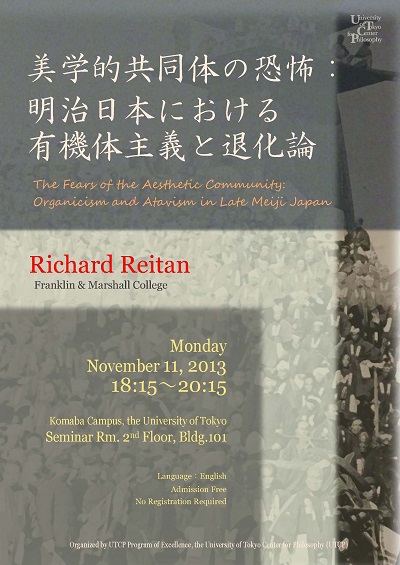
|
Title: | The Fears of the Aesthetic Community: Organicism and Atavism in Late Meiji Japan終了しました |
||
|---|---|---|---|---|
| Date: | 2013年11月11日(月) 18:15-20:15 |
Place: | 東京大学駒場キャンパス101号館2階研修室 |
|
The Fears of the Aesthetic Community: Organicism and Atavism in Late Meiji Japan
美学的共同体の恐怖:明治日本における有機体主義と退化論
Monday, Nov. 11, 2013, 18:15-20:15
Venue: Bld.101, 2F, Seminar Room, The University of Tokyo, Komaba
Speaker
Richard Reitan (Franklin & Marshall College)
Abstract
This presentation of my recent research concerns the ways in which the excesses of capitalism are concealed and contained so as to sustain a given exploitative socio-economic status quo. In particular, I am interested in the various ideological and material strategies of late Meiji Japan that worked to conceal uneven socio-economic conditions and contain the disruptions to the status quo associated with the so-called 社会問題 (social problems) that became increasingly intense at this time. Organicism (有機体説) was one such strategy. Social atavism (隔世遺伝) or degeneration (退化論) was another. The former claimed that each individual belonged to an organic folk community. This was a response to the waning authority of the promise of “progress” and to the broad social alienation associated with industrial capitalism and its attendant conception of the individual as autonomous, self-determining and self-responsible. The latter, degeneration, reflected the fear of social and racial decline that some saw in late Meiji crowd uprisings, widespread poverty, crime, etc. In other words, the shakai mondai, viewed through the lens of organicism, were understood and explained as a confirmation of social degeneration. Why did a discourse on degeneration emerge when it did? How (and how effectively) did it function? What was the relationship between this discourse on degeneration and the narrative of organic folk community? I suggest that the answer to these questions lies in the way social relations, by late Meiji, came to be aestheticized.
Speaker's Biography
Richard Reitan is associate professor of history at Franklin & Marshall College (Pennsylvania, USA). He is the author of Making a Moral Society: Ethics and the State in Meiji Japan (Hawaii, 2010) and various articles on Japanese intellectual history including “Narratives of Equivalence: Neoliberalism in Contemporary Japan,” Radical History Review 112 (2012): 43-64, and “Völkerpsychologie and the Appropriation of ‘Spirit’ in Meiji Japan,” Modern Intellectual History 7,3 (2010): 495-522. He was unofficially affiliated with the University of Tokyo Center for Philosophy during a year of research from 2009 to 2010.
Language: English | Admission free | No registration required
Organized by UTCP Program of Excellence, the University of Tokyo Center for Philosophy (UTCP)







